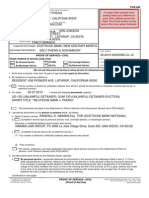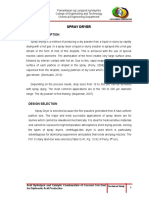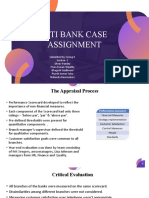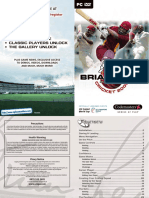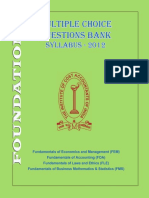The Fair Debt Collection Practices Act
The Fair Debt Collection Practices Act
Uploaded by
Johnson DamitaCopyright:
Available Formats
The Fair Debt Collection Practices Act
The Fair Debt Collection Practices Act
Uploaded by
Johnson DamitaOriginal Title
Copyright
Available Formats
Share this document
Did you find this document useful?
Is this content inappropriate?
Copyright:
Available Formats
The Fair Debt Collection Practices Act
The Fair Debt Collection Practices Act
Uploaded by
Johnson DamitaCopyright:
Available Formats
The Fair Debt Collection Practices Act
15 U.S.C. § 1692 et seq.
I. Overview
A. Enacted in 1978 to prevent personal bankruptcy, marital instability, loss of
employment and invasion of personal privacy.
B. Prohibits false, deceptive, misleading, harassing, abusive and offensive
conduct during collection of consumer debts.
II. Definitions
A. “Consumer”: any natural person obligated or allegedly obligated to pay a
debt. 15 U.S.C. § 1692a(3).
B. “Debt”: any obligation or alleged obligation of a consumer to pay money for
goods or services that are primarily for personal, family or household
purposes. 15 U.S.C. § 1692a(5).
a. DOES NOT COVER taxes, criminal restitution. Obligation must result
from a consumer transaction.
b. DOES NOT COVER businesses or individuals alleged to owe debts
incurred in the operation of a business.
C. “Debt Collectors”: any person who uses any instrumentality of interstate
commerce (phone, mail, email) in any business, the principal purpose of
which is collection of the debts of another. 15 U.S.C. § 1692a(6).
a. APPLIES TO:
i. Attorneys who regularly collect debts. Heintz v. Jenkins, 514 U.S.
291, 115 S.Ct. 1489 (1995).
ii. Creditors who hold themselves out to be debt collectors.
b. DOES NOT APPLY TO:
i. “Creditors”: any person or entity that extends credit, creating a debt,
to whom the debt is owed. 15 U.S.C. § 1692a(4). Examples: Chase
Bank, MBNA Bank, HSBC.
ii. Any officer or employee of the creditor.
iii. Any officer or employee of the United States or any State.
iv. Companies with common ownership with a creditor.
v. Anyone attempting to serve legal process.
D. “Communication”: conveying of information regarding a debt directly or
indirectly to any person through any medium. 15 U.S.C. § 1692a(2).
III. Requirements and Prohibitions (this is not a complete list)
A. Restricted Communications
a. Cannot discuss the debt with a 3rd party. 15 U.S.C § 1692b(2).
b. Can only contact a 3rd party one time for the purpose of obtaining location
information. 15 U.S.C. § 1692b(3)
c. Can’t call before 8am or after 9pm. 15 U.S.C. § 1692c(a)(1).
d. Cannot contact consumer if known to be represented by an attorney. 15
U.S.C. § 1692c(a)(2)
e. Cannot contact consumer’s place of work if consumer notified debt
collector not to call work. Oral notice is sufficient. 15 U.S.C. §
1692c(a)(3).
f. Cannot contact consumer if consumer advises debt collector in writing to
cease communications OR that consumer refuses to pay. 15 U.S.C. §
1692c.
B. Abuse/Harassment
a. Act provides a general prohibition against harassing, abusive and/or
oppressive conduct. 15 U.S.C. § 1692d.
b. Collector can’t threaten violence or use of criminal activity towards
consumer or property. 15 U.S.C § 1692d(1).
c. Collector can’t use obscene or profane language. 15 U.S.C. § 1692d(2).
d. Collector can’t publish lists of debtors or advertise debts, including
blacklisting. 15 U.S.C. § 1692d(3).
e. Collector can’t cause phone to ring repeatedly for purposes of harassing or
annoying. 15 U.S.C. § 1692d(4).
f. Collector can’t place calls to consumer without meaningful disclosure of
identity. 15 U.S.C. § 1692d(6).
C. False, Deceptive or Misleading
a. FDCPA provides a general prohibition against use of false, deceptive or
misleading collection tactics. A collector’s actions are to be interpreted
from the perspective of the "least sophisticated consumer." Martsolf v.
JBC Legal Group, P.C., 2008 U.S. Dist. LEXIS 6876 (M.D. Pa. Jan. 30,
2008); Nelson v. Select Fin. Servs., 430 F. Supp. 2d 455, 457 (E.D. Pa.
2006).
b. Collector cannot make any false, deceptive or misleading statements.
15 U.S.C. § 1692e, e(10).
c. Collector cannot falsely represent character, amount or legal status of debt.
15 U.S.C. § 1692e(2)(A).
d. Collector cannot falsely represent himself/herself as an attorney. 15
U.S.C. § 1692e(3).
e. Collector cannot state or imply that non-payment will result in arrest
or criminal prosecution. 15 U.S.C. § 1692e(4).
f. Collector cannot threaten suit, garnishment or seizure of property without
legal ability to do the same. 15 U.S.C. § 1692e(5). Ex: Threatening suit
to collect a time-barred debt. Martsolf v. JBC Legal Group, P.C., 2008
U.S. Dist. LEXIS 6876 (M.D. Pa. Jan. 30, 2008).
g. Collector cannot report or threaten to report false credit information (like
fraud). 15 U.S.C. § 1692e(8). (ties to FCRA)
D. Unfair or Unconscionable
a. Act provides general prohibition against the use of any unfair or
unconscionable means to collect a debt. 15 U.S.C. § 1692f.
b. Collector cannot attempt to collect any amount not authorized by the
agreement creating the debt or permitted by law. (This usually comes up
if collector takes more than authorized by electronic funds transfer.) 15
U.S.C. § 1692f(1).
c. Collector cannot accept or solicit postdated check without providing
written notice of at least 3 days that intends to deposit. 15 U.S.C. §
1692f(2).
d. Collector cannot accept or solicit postdated check for purpose of
threatening criminal prosecution. 15 U.S.C. § 1692f(3).
E. Notice Requirements
a. Notices sent pursuant to Section 1692g are to be interpreted from the
perspective of the "least sophisticated consumer." Martsolf v. JBC
Legal Group, P.C., 2008 U.S. Dist. LEXIS 6876 (M.D. Pa. Jan. 30,
2008); Nelson v. Select Fin. Servs., 430 F. Supp. 2d 455, 457 (E.D. Pa.
2006)
b. Collector shall provide the following notices:
i. Initial communication (oral or written): “This communication is
from a debt collector in an attempt to collect a debt. Any
information obtained will be used for that purpose.” 15 U.S.C. §
1692e(11).
ii. Each subsequent communication: “This communication is from a
debt collector,” or “this is an attempt to collect a debt.” 15 U.S.C.
§ 1692a(11).
iii. Within 5 days of initial communication (oral or written), in
writing:
1. Amount of the debt, 15 U.S.C. § 1692g(a)(1);
2. Name of the creditor owed 15 U.S.C. § 1692g(a)(2);
3. Right to dispute validity within 30 days, 15 U.S.C. §
1692g(a)(3); and
4. Name and address of the original creditor, 15 U.S.C. §
1692g(a)(5).
5. If disputed by consumer within 30 days, collector will provide
verification of the debt, 15 U.S.C. § 1692g(a)(4).
IV. Enforcement
A. FDCPA is a strict liability statute. 15 U.S.C. § 1692k; Foti v. NCO Fin. Sys.,
424 F. Supp. 2d 643 (S.D.N.Y. 2006).
B. FDCPA claims have a one year statute of limitations. 15 U.S.C. § 1692k(d).
C. Claims can be brought in state or federal court. 15 U.S.C. § 1692k(d); Itri v.
Equibank, N.A., 318 Pa. Super. 268, 282 (Pa. Super. Ct. 1983).
D. Upon successful litigation of an individual suit, plaintiff/consumer is entitled
to:
a. Any actual damages, 15 U.S.C. § 1692k(a)(1), including emotional
distress, McNally v. Client Services, 2008 U.S. Dist. LEXIS 66845 (W.D.
Pa. 2008); and
b. Statutory damages of up to $1000, 15 U.S.C. § 1692k(a)(2)(A); and
c. Costs expended in litigation, 15 U.S.C. § 1692k(a)(3); and
d. Reasonable attorney’s fees, 15 U.S.C. § 1692k(a)(3).
Examples:
$24,693.80 in Nelson v. Select Financial Serv., Inc., 2006 U.S.Dist.
LEXIS 42637 (E.D.Pa. 2006)(collector used the phrase "verifies the
validity of this debt" in a letter to debtor);
$9195.83 in Rivera v. Corporate Receivables, Inc., 540 F. Supp. 2d
329 (D. Conn. 2008).
$5713 in Holliday v. Cabrera & Assocs., P.C., 2007 U.S. Dist. LEXIS
161 (E.D. Pa. Jan. 3, 2007)
E. Upon successful litigation of a class action, the class of consumer is entitled
to:
a. The lesser of $500,000 or 1% of the net worth of the collector. 15 U.S.C. §
1692k(a)(2)(B); and
b. Costs expended in litigation, 15 U.S.C. § 1692k(a)(3); and
c. Reasonable attorney’s fees, 15 U.S.C. § 1692k(a)(3).
F. Defenses
a. Factual dispute
b. Bone fide error:
i. Violation was NOT intentional, AND
ii. Resulted from bona fide error, AND
iii. Collector employs reasonable procedures to prevent such violations.
Piper v. Portnoff Law Associates, 274 F.Supp.2d 681 (E.D.Pa. 2003).
iv. Burden of proof is on the collector.
v. Generally only applies to clerical or factual errors. Picht v. Jon R.
Hawks, Ltd., 236 F.3d 446, 451-52 (8th Cir. 2001); Pipiles v. Credit
Bureau of Lockport, Inc., 886 F.2d 22, 27 (2nd Cir. 1989); Baker v. GC
Servs. Corp., 677 F.2d 775, 779 (9th Cir. 1982).
vi. Intentionally excluding required language is not a bona fide error.
Nielsen v. Dickerson, 307 F.3d 623, 640 (7th Cir. 2002).
V. Recent Amendments to FDCPA and Recent Caselaw
A. Amendments
a. FDCPA-compliant collection activities may be undertaken by debt
collectors during the 30-day validation period absent a consumers request
for validation. 15 U.S.C. § 1692g(b).
b. Any collection activities conducted within 30-day validation period must
not overshadow consumer’s validation rights. 15 U.S.C. § 1692g(b).
c. Formal pleading in a civil action does not constitute the initial
communication. 15 U.S.C. § 1692g(c).
d. Notices not related to collection of debt, such as IRS forms, Gramm-
Leach-Bliley Act or other forms required by state or federal law do not
require 1682e(11) notice. 15 U.S.C. § 1692g(e).
e. Exceptions were added for private entities employed by the government to
collect fees, fines and restitution for bad checks. 15 U.S.C. § 1692p.
B. Recent Case Law
Note: Since this is a federal statute, there are hundreds of cases interpreting
the provisions outlined here, and we have not attempted to summarize them,
but we are providing a few recent cases of interest.
a. No “bona fide error” defense for mistakes of law. Letter can’t say “you
must dispute in writing.” Jermyn v. Carlisle, McNellie, et al. - US
Supreme Court - April 21, 2010,
(http://www.supremecourt.gov/opinions/09pdf/08-1200.pdf)
b. Threatening or bringing suit on time-barred debt violates the FDCPA.
Martsolf v. JBC Legal Group, P.C., 2008 U.S. Dist. LEXIS 6876 (M.D.
Pa. Jan. 30, 2008); Richburg v. Palisades Collection LLC, 247 F.R.D.
457 (E.D. Pa. 2008).
c. Vicarious liability: The client of an attorney who is a "debt collector,"
as defined in § 1692a(6), is vicariously liable for the attorney's
misconduct if the client is itself a debt collector. Duraney v. Wash. Mut.
Bank F.A., 2008 U.S. Dist. LEXIS 72087 (W.D. Pa. Sept. 11, 2008).
d. A debtor’s failure to request validation does not waive any right the
debtor might have to deny validity at a letter date, and telling a debtor
that failing to respond will verify the validity of the debt violates
FDCPA. Nelson v. Select Financial Serv., Inc., 2006 U.S.Dist. LEXIS
42637 (E.D.Pa. 2006); Gigli v. Palisades Collection, L.L.C., 2008 U.S.
Dist. LEXIS 62684 (M.D. Pa. Aug. 14, 2008).
e. A debt collection letter can be deceptive under the FDCPA even if it
only implies that it is from an attorney. Using the phrase "Legal
Department" could imply to the least sophisticated debtor that a lawyer
was involved in drafting or sending the letter. Rosenau v. Unifund
Corp., 539 F.3d 218 (3d Cir. Pa. 2008)
f. The FDCPA does apply to litigation activities, including formal
pleadings by attorneys. Phath v. J. Scott Watson, P.C., 2008 U.S. Dist.
LEXIS 17563 (E.D. Pa. Mar. 7, 2008). See exception for 1692g notices.
g. A writing is deceptive where it can reasonably be read to have two or
more different meanings, one of which is inaccurate. A letter was
misleading because it gave the impression that the debt was being
pursued by "high-ranking officer of the company," when in fact it was
not, thereby creating a false impression as to source, authorization or
approval. Campuzano-Burgos v. Midland Credit Mgmt., 497 F. Supp. 2d
660 (E.D. Pa. 2007).
h. “Mini-Miranda” (1692e(11) notice) is required when debt collector
leaves pre-recorded message for debtor. Foti v. NCO Financial Systems,
Inc., 424 F.Supp.2d 643 (S.D.N.Y. 2006).
VI. Other statutes that may apply:
Telephone Consumer Protection Act of 1991 (47 U.S.C. § 227)
Fair Credit Extension Uniformity Act (73 P.S. § 2270.1 et seq.)
Unfair Trade Practices and Consumer Protection Law (73 P.S. § 201-1 et seq.)
You might also like
- Fight Debt Collectors and Win: Win the Fight With Debt CollectorsFrom EverandFight Debt Collectors and Win: Win the Fight With Debt CollectorsRating: 5 out of 5 stars5/5 (12)
- Sample Debt Dispute Letter - FDCPADocument5 pagesSample Debt Dispute Letter - FDCPAAC0% (1)
- Debt Collector Response Template 2Document1 pageDebt Collector Response Template 2FreedomofMind100% (2)
- Pos040 - PROOF OF SERVICE-CIVILDocument3 pagesPos040 - PROOF OF SERVICE-CIVILSalvadah0% (1)
- Debt Collector Dispute Letter 1Document1 pageDebt Collector Dispute Letter 1Elcana MathieuNo ratings yet
- Dispute After Investigation The Prove It LetterDocument1 pageDispute After Investigation The Prove It LetternellNo ratings yet
- 2013.06.28 Debt Validation LetterDocument3 pages2013.06.28 Debt Validation Letteraquacool21No ratings yet
- Why Your Loans Under The Fed System Should Be CancelledDocument1 pageWhy Your Loans Under The Fed System Should Be CancelledNat Williams100% (1)
- Reply To Accusation of Credit RepairDocument2 pagesReply To Accusation of Credit RepairnellNo ratings yet
- Cushman v. Trans Union CorporationDocument11 pagesCushman v. Trans Union CorporationKenneth SandersNo ratings yet
- United States District Court Middle District of Florida Orlando DivisionDocument5 pagesUnited States District Court Middle District of Florida Orlando DivisionFreedomofMind100% (3)
- All Debts Are Prepaid PDFDocument7 pagesAll Debts Are Prepaid PDFNat Williams100% (1)
- Find Respa, Tila Fdcpa Fcra Violation CaselawDocument14 pagesFind Respa, Tila Fdcpa Fcra Violation CaselawDeon Thomas100% (2)
- Branching Strategies PDFDocument16 pagesBranching Strategies PDFadrianflNo ratings yet
- Dynagraph Card AnalysisDocument4 pagesDynagraph Card AnalysisCedric Kimloaz100% (2)
- Transmision Automatica Rexton (Manual de Taller)Document60 pagesTransmision Automatica Rexton (Manual de Taller)Carlos Car - PerNo ratings yet
- Share Vesting Agreement - ZegalDocument6 pagesShare Vesting Agreement - ZegalAlan PetzoldNo ratings yet
- SQL Interview Questions - DB MirroringDocument19 pagesSQL Interview Questions - DB Mirroringjagan36No ratings yet
- Project Report On Pavement DesignDocument50 pagesProject Report On Pavement Designsagar kumar100% (1)
- FDCPA PitfallsDocument35 pagesFDCPA Pitfallsspcbanking100% (2)
- Cases - FDCPA Dan BenhamDocument4 pagesCases - FDCPA Dan BenhamTitle IV-D Man with a plan50% (2)
- Midland Credit Management, Inc. COMPLAINT - Doc - 0Document6 pagesMidland Credit Management, Inc. COMPLAINT - Doc - 0Samuel RichardsonNo ratings yet
- Chexsystems Prove It 2 (Gentle)Document1 pageChexsystems Prove It 2 (Gentle)Elcana MathieuNo ratings yet
- 4th MAILING - Notice and Demand For Payment - SampleDocument1 page4th MAILING - Notice and Demand For Payment - SampleJeromeKmtNo ratings yet
- Fdcpa 30 Day RuleDocument16 pagesFdcpa 30 Day RuleTRISTARUSANo ratings yet
- Student Loan Validation of DebtDocument47 pagesStudent Loan Validation of DebtMuna Kaya & Chayton Hassun ElNo ratings yet
- Ach Payment - Facebook-Discharge Debt LetterDocument2 pagesAch Payment - Facebook-Discharge Debt LetterJohnson DamitaNo ratings yet
- FDCPA Edleman CombsDocument43 pagesFDCPA Edleman CombsDarren Chaker100% (5)
- 4a Demand To Cease and Desist Collection ActivitiesDocument2 pages4a Demand To Cease and Desist Collection ActivitiesAkil Bey100% (1)
- Jan 5 Service Package With NotarizationDocument131 pagesJan 5 Service Package With NotarizationD B Karron, PhD50% (2)
- Tila and Respa ClaimsDocument3 pagesTila and Respa Claimsgaborik1No ratings yet
- Ana Cordero 116 W 238 ST Apt 6E Bronx NY 10463-4221: REF: Account # NZ3486Document1 pageAna Cordero 116 W 238 ST Apt 6E Bronx NY 10463-4221: REF: Account # NZ3486jamesdeciliaNo ratings yet
- Sample Letter To Credit BureauDocument1 pageSample Letter To Credit BureausssNo ratings yet
- Noice of Pending Suit FDCPADocument1 pageNoice of Pending Suit FDCPAPublic Knowledge100% (1)
- Follow Up Debt Validation - No Response To 3 LetterDocument1 pageFollow Up Debt Validation - No Response To 3 LetterrodneyNo ratings yet
- Formal Notice: /3rd Parties /solicitors Etc ? - SEND THEM THIS!Document3 pagesFormal Notice: /3rd Parties /solicitors Etc ? - SEND THEM THIS!KNOWLEDGE SOURCENo ratings yet
- Credit Card Billing Fraud Appellant's Opening BriefDocument35 pagesCredit Card Billing Fraud Appellant's Opening BriefEmanuel McCrayNo ratings yet
- Ammended Fed ComplaintDocument22 pagesAmmended Fed ComplaintBhakta PrakashNo ratings yet
- Remedies For Breach of ContractDocument2 pagesRemedies For Breach of ContractShakil Faraji100% (1)
- 1a - Unsecured Debt - Affidavit - Collection AgencyDocument14 pages1a - Unsecured Debt - Affidavit - Collection AgencyCK in DCNo ratings yet
- Brandon Debt Verification (AFNI)Document2 pagesBrandon Debt Verification (AFNI)DEVNo ratings yet
- Form For Filing FDCPA Law SuitDocument18 pagesForm For Filing FDCPA Law Suitnutech18100% (3)
- Attorney Acting As Debt Collector LawsuitDocument54 pagesAttorney Acting As Debt Collector LawsuitAkil Bey100% (2)
- Stop All Lawsuits in The Following MannerDocument2 pagesStop All Lawsuits in The Following MannerKNOWLEDGE SOURCE100% (3)
- 16 Key Laws That A Debt Collector Should FollowDocument2 pages16 Key Laws That A Debt Collector Should FollowFreedomofMind100% (1)
- Lawsuit Against J. Mark Heldenbrand, PC Debt Collector and Attorney 1 (602) 254-3400Document15 pagesLawsuit Against J. Mark Heldenbrand, PC Debt Collector and Attorney 1 (602) 254-3400John SchromNo ratings yet
- 2017-02-24 Margarita Mares Rescission LetterDocument1 page2017-02-24 Margarita Mares Rescission Letterapi-360769610No ratings yet
- 2 Template Noticeoffault UsaDocument11 pages2 Template Noticeoffault UsaYarod ELNo ratings yet
- Excellent Document - Notice of Fraud To Collection Agency IIDocument2 pagesExcellent Document - Notice of Fraud To Collection Agency IICK in DC100% (2)
- 1 - Debt Collector LetterDocument1 page1 - Debt Collector LetterDebbieCook59No ratings yet
- 001 Tila Rescission Case Adversary Proceeding Ruling in Favor of BorrowersDocument31 pages001 Tila Rescission Case Adversary Proceeding Ruling in Favor of BorrowersCarrieonic100% (1)
- Stroman ComplaintDocument79 pagesStroman ComplaintFrank JeanNo ratings yet
- Debt Declaration of Fraud LetterDocument4 pagesDebt Declaration of Fraud LetterWesley Barnard100% (4)
- Robert Peterson v. Portfolio Recovery Associates, 3rd Cir. (2011)Document9 pagesRobert Peterson v. Portfolio Recovery Associates, 3rd Cir. (2011)Scribd Government DocsNo ratings yet
- DOE Student Loan Injunction ViolationDocument34 pagesDOE Student Loan Injunction ViolationLaw&Crime100% (1)
- Fed CRDT Proc ActDocument3 pagesFed CRDT Proc ActtrustkonanNo ratings yet
- Business Tax Credit For Research And Development A Complete Guide - 2020 EditionFrom EverandBusiness Tax Credit For Research And Development A Complete Guide - 2020 EditionNo ratings yet
- Swindled: If Government is ‘for the people’, Why is the King Wearing No Clothes?From EverandSwindled: If Government is ‘for the people’, Why is the King Wearing No Clothes?Rating: 5 out of 5 stars5/5 (2)
- Stop Bill Collectors: The No Bull Guide to Outwitting Bill CollectorsFrom EverandStop Bill Collectors: The No Bull Guide to Outwitting Bill CollectorsRating: 5 out of 5 stars5/5 (1)
- The Application of Commercial LawDocument53 pagesThe Application of Commercial LawJohnson Damita100% (4)
- Ach Payment - Facebook-Discharge Debt LetterDocument2 pagesAch Payment - Facebook-Discharge Debt LetterJohnson DamitaNo ratings yet
- Farnsworth On Contracts, ©2004 by E. Allan Farnsworth, Third EditionDocument1 pageFarnsworth On Contracts, ©2004 by E. Allan Farnsworth, Third EditionJohnson DamitaNo ratings yet
- A4v Discharge Real Estate Mortgage NetworkDocument13 pagesA4v Discharge Real Estate Mortgage NetworkJohnson Damita100% (2)
- Core - Security.patterns - Best.practices - And.strategies - for.J2EE - Web.services - And.identity - Management.oct.2005 0131463071Document848 pagesCore - Security.patterns - Best.practices - And.strategies - for.J2EE - Web.services - And.identity - Management.oct.2005 0131463071blackstileNo ratings yet
- Geo7Series UserGuide PDFDocument133 pagesGeo7Series UserGuide PDFAji SatrioNo ratings yet
- A Study On Effective Cash Management System Performance in Abc Techno Labs India Private LimitedDocument8 pagesA Study On Effective Cash Management System Performance in Abc Techno Labs India Private LimitedBabasaheb JawalgeNo ratings yet
- 328916782-Spray-Dryer-Design-UPDATED3 جدا جداDocument14 pages328916782-Spray-Dryer-Design-UPDATED3 جدا جداeidNo ratings yet
- Mastering GitDocument27 pagesMastering GitmutukuNo ratings yet
- Spec ABC AccessoriesDocument14 pagesSpec ABC AccessoriesPutra HermanNo ratings yet
- PM - SDD - Master Data - V1.0Document13 pagesPM - SDD - Master Data - V1.0Dhanush S T100% (1)
- IS Test BankDocument5 pagesIS Test BankThea PradoNo ratings yet
- Linear Equation Word ProblemDocument14 pagesLinear Equation Word ProblemHao LuNo ratings yet
- Lm6000 Power Plants: Simple Cycle Efficiency Simple Cycle OutputDocument1 pageLm6000 Power Plants: Simple Cycle Efficiency Simple Cycle OutputErik Van GroningenNo ratings yet
- Documents of Nigist Kassa AbayDocument6 pagesDocuments of Nigist Kassa AbayAnonymous yKdBSTGcF100% (1)
- Vascular Access and Infusion TherapyDocument47 pagesVascular Access and Infusion TherapyMaria Margarita100% (1)
- Conveyor Products1Document23 pagesConveyor Products1vegamarco80No ratings yet
- JOINT PIT Type 1Document2 pagesJOINT PIT Type 1annasNo ratings yet
- Citi Bank Case AssignmentDocument7 pagesCiti Bank Case AssignmentFun Toosh345No ratings yet
- Institute Name: Indian Institute of Technology Hyderabad (IR-O-U-0013)Document14 pagesInstitute Name: Indian Institute of Technology Hyderabad (IR-O-U-0013)Zain RashidNo ratings yet
- 11 Chapter 7Document69 pages11 Chapter 7shovan1234No ratings yet
- 2002-2004, Belanak FPSO - Juare97's Blog Berbagi Pengalaman & PengetahuanDocument7 pages2002-2004, Belanak FPSO - Juare97's Blog Berbagi Pengalaman & PengetahuanwidiNo ratings yet
- Investment in Subsidiary Problem A - Equity Model and Cost ModelDocument7 pagesInvestment in Subsidiary Problem A - Equity Model and Cost ModelJessica IslaNo ratings yet
- Brian Lara International Cricket 2005 - Manual - PCDocument18 pagesBrian Lara International Cricket 2005 - Manual - PCdoomdiver1No ratings yet
- Red Alert! Newsletter March-AprilDocument5 pagesRed Alert! Newsletter March-AprilnessimzriouilNo ratings yet
- Case Title: Alba Et Al. vs. YupangcoDocument3 pagesCase Title: Alba Et Al. vs. YupangcoRewel Jr. MedicoNo ratings yet
- ThiesDeviceUtility ManualDocument24 pagesThiesDeviceUtility Manualcagil.greenpowermonitorNo ratings yet
- Foundation MCQ 2012Document337 pagesFoundation MCQ 2012shivam kumarNo ratings yet



